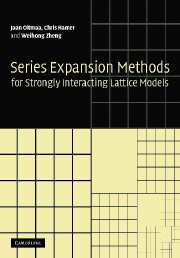
-
Select format
-
- Publisher:
- Cambridge University Press
- Publication date:
- January 2010
- April 2006
- ISBN:
- 9780511584398
- 9780521842426
- 9780521143592
- Dimensions:
- (247 x 174 mm)
- Weight & Pages:
- 0.837kg, 338 Pages
- Dimensions:
- (244 x 170 mm)
- Weight & Pages:
- 0.54kg, 338 Pages
You may already have access via personal or institutional login
Book description
Perturbation series expansion methods are sophisticated numerical tools used to provide quantitative calculations in many areas of theoretical physics. This book gives a comprehensive guide to the use of series expansion methods for investigating phase transitions and critical phenomena, and lattice models of quantum magnetism, strongly correlated electron systems and elementary particles. Early chapters cover the classical treatment of critical phenomena through high-temperature expansions, and introduce graph theoretical and combinatorial algorithms. The book then discusses high-order linked-cluster perturbation expansions for quantum lattice models, finite temperature expansions, and lattice gauge models. Also included are numerous detailed examples and case studies, and an accompanying resources website, www.cambridge.org/9780521842426, contains programs for implementing these powerful numerical techniques. A valuable resource for graduate students and postdoctoral researchers working in condensed matter and particle physics, this book will also be useful as a reference for specialized graduate courses on series expansion methods.
Reviews
"The present book is unique as it combines a pedagogical approach to series expansion techniques with modern applications in quantum systems. The authors succeed in making this technical subject attractive for newcomers... the book can be recommended to any researcher who wishes to learn series expansion techniques."
Michel Pleimling, Mathematical Reviews
Contents
Metrics
Full text views
Full text views help Loading metrics...
Loading metrics...
* Views captured on Cambridge Core between #date#. This data will be updated every 24 hours.
Usage data cannot currently be displayed.
Accessibility standard: Unknown
Why this information is here
This section outlines the accessibility features of this content - including support for screen readers, full keyboard navigation and high-contrast display options. This may not be relevant for you.
Accessibility Information
Accessibility compliance for the PDF of this book is currently unknown and may be updated in the future.


